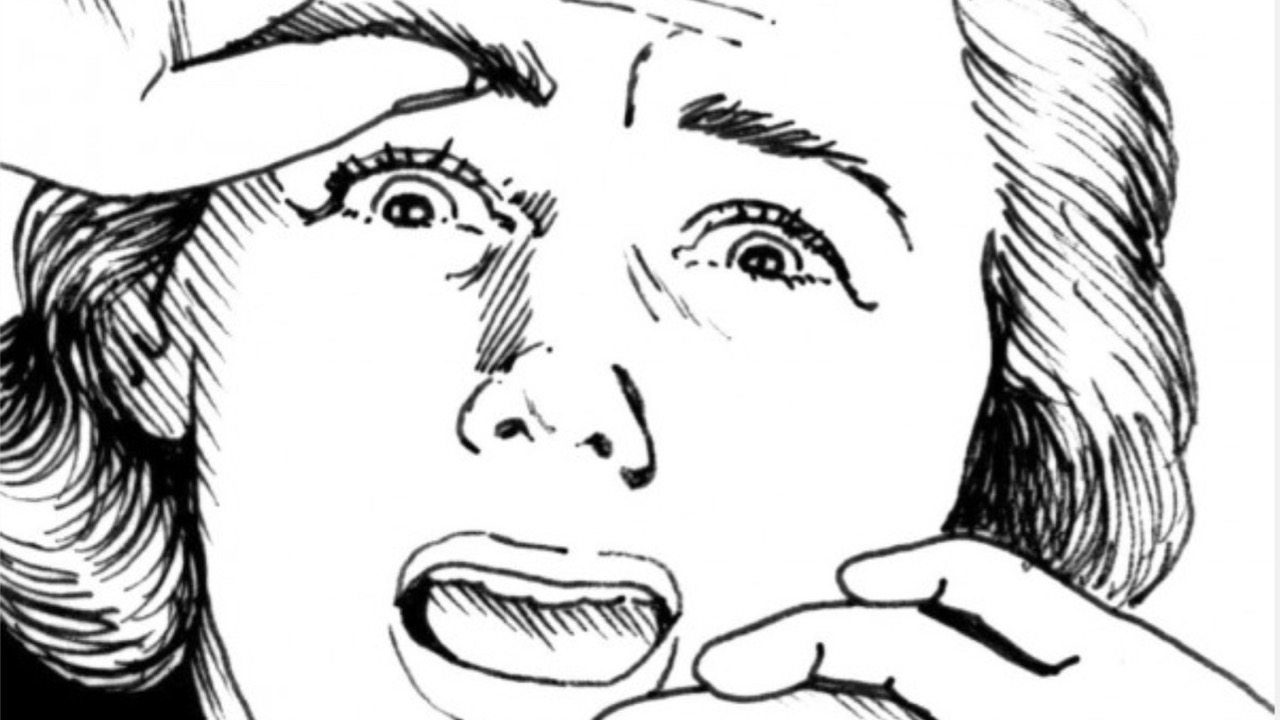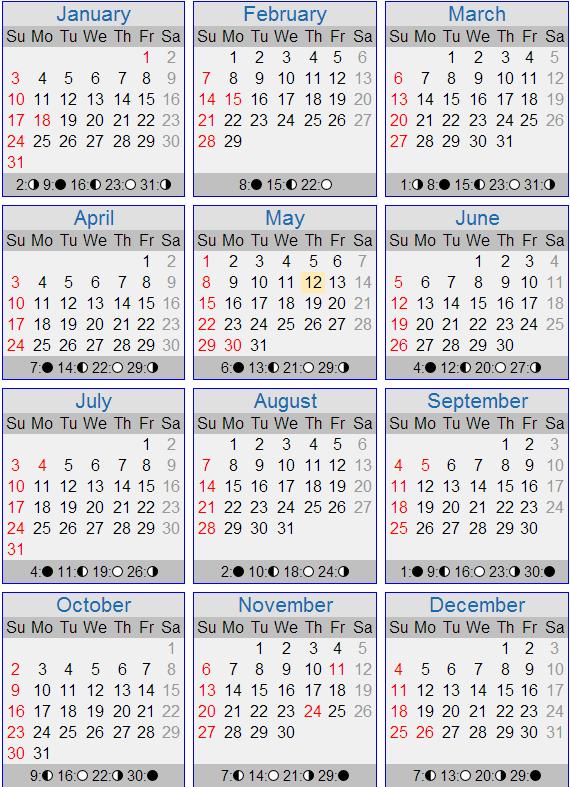
May 13, 2016 is a Friday, ushering this year’s lone Friday the 13th. Every year has at least one Friday the 13th, and, depending on the year, there can be two Friday the 13ths or a maximum of three Friday the 13ths in any given year. For example, last year, in 2015, there were three (February, March, November). Next year, in 2017, there will be two (January and October).
Not that we at EarthSky suffer from friggatriskaidekaphobia – an irrational fear of Friday the 13th – but, gosh darn, this year’s lone Friday the 13th happens exactly 26 weeks (2 x 13 weeks) after the previous Friday the 13th in November, 2015. But that’s hardly the end of it. The Friday the 13th on May 13, 2016 happens exactly 65 weeks (5 x 13 weeks) after the first of three Friday the 13ths in 2015 (February 13). And next year, in 2017, the Friday the 13th in January comes exactly 39 weeks (3 x 13 weeks) before the Friday the 13th in October.
Yikes, that’s quite a few of coincidences involving the number 13 … though I could cite many more!
Follow the links below to learn more about why some people fear this day and about the intriguing numerology of Friday the 13th and the calendar.
Scary coincidence or super unlucky?
In 2016, blame a leap year starting on Friday
How often does Friday the 13th happen in May?
Rhyme and reason for the 400-year Friday the 13th cycle


Scary coincidence or super unlucky? Neither. It’s just a quirk of our calendar, as you’ll see as you keep reading.
The fact is that, according to folklorists, there’s no written evidence that Friday the 13th was considered unlucky before the 19th century. The earliest known documented reference in English appears to be in Henry Sutherland Edwards’ 1869 biography of Gioachino Rossini. His portrait is on this page. He doesn’t look scary.
Friday has always gotten a bad rap. In the Middle Ages, people would not marry – or set out on a journey – on a Friday.
There are also some links between Christianity and an ill association with either Fridays or the number 13. Jesus was said to be crucified on a Friday. Seating 13 people at a table was seen as bad luck because Judas Iscariot, the disciple who betrayed Jesus, is said to have been the 13th guest at the Last Supper. Meanwhile, our word for Friday comes from Frigga, an ancient Scandinavian fertility and love goddess. Christians called Frigga a witch and Friday the witches’ Sabbath.
In modern times, the slasher-movie franchise Friday the 13th has helped keep friggatriskaidekaphobia alive.
Enjoying EarthSky so far? Sign up for our free daily newsletter today!
In 2016, blame a leap year starting on Friday. The year 2016 started on a Friday. Whenever a leap year of 366 days starts on a Friday, it’s inevitable that the month of May will start on a Sunday. And any month starting on a Sunday always has a Friday the 13th.
Leap years starting on Friday (or any given weekday) recur in cycles of 28 years. That’s because you can count on dates and days to realign every 28 years. Thus, we can figure that the following years will feature a lone Friday the 13th in the month of May:
2016, 2044 and 2072
You might think the year 2100 should also have a lone Friday, May 13, given that 2072 + 28 = 2100. But here’s where the Gregorian calendar throws a monkey wrench at us. By Gregorian calendar rules, century years not equally divisible by 400 (e.g. 2100, 2200, 2300) are not leap years of 366 days – but rather, common years of 365 days. So, in the year 2100, the first day of the year still starts on a Friday, but since it’s a common year of 365 days, the lone Friday the 13th will fall on August 13, 2100.
In the 22nd century (2101 to 2200), the first leap year Friday the 13th in the month May happens in the year 2112, to recur in 2140, 2168 and 2196
How often does Friday the 13th happen in May? More often than you might imagine! The last Friday the 13th to take place in the month of May happened five years ago, in 2011. It will next happen six years from now, in 2022. We must emphasize that these are common years of 365 days, and any common year starting on a Saturday will have a lone Friday the 13th in May. Throughout the 21st century (2001 to 2100), a common-year Friday the 13th in May always happens five years before – and six years after – a leap-year Friday the 13th in May.
The first year to have a May Friday the 13th in the 21st century (2001 to 2100) is the common year 2005. The year 2005 comes one year after a leap year, and any year coming one year after a leap year has the same days coinciding with the same dates in cycles of 6, 17 and 28 years: 2011 (2005 + 6), 2022 (2005 + 17) and 2033 (2005 + 28). Thus, a grand total of eleven common-year Friday, May the 13ths, occur in the 21st century (2001-2100):
2005, 2011, 2022, 2033, 2039, 2050, 2061, 2067, 2078, 2089 and 2095
Adding in the three leap-year Friday, May the 13ths (below in bold) gives a total of 14 Friday, May the 13ths in the 21st century (2001 to 2100):
2005, 2011, 2016, 2022, 2033, 2039, 2044, 2050, 2061, 2067, 2072, 2078, 2089 and 2095
Once again, note that a common-year Friday, May the 13th, comes five years before – and six years after – a leap-year Friday, May the 13th.
Because the Gregorian calendar has a 400-year cycle, we also know common-year and leap-year Friday, May the 13ths will repeat exactly 400 years later in the 25th century (2401-2500):
2405, 2411, 2416, 2422, 2433, 2439, 2444, 2450, 2461, 2467, 2472, 2478, 2489 and 2495
Calendar for 2016

Rhyme and reason for the 400-year Friday the 13th cycle.
Because the Gregorian calendar suppresses the leap year in 2100, the cycle is perturbed, meaning that all the May Friday the 13th years in the 22nd century (2101-2200) come four years earlier than in the 21st century (leap years in bold):
2101, 2107, 2112, 2118, 2129, 2135, 2140, 2146, 2157, 2163, 2168, 2174, 2185, 2191 and 2196.
The cycle is perturbed again in the 23rd century (2201-2300):
2203, 2208, 2214, 2225, 2231, 2236, 2242, 2253, 2259, 2264, 2270, 2281, 2287, 2292 and 2298
And again in the 24th century (2301-2400):
2304, 2310, 2321, 2327, 2232, 2338, 2349, 2355, 2360, 2366, 2377, 2383, 2388 and 2394
Gregoriana cycle of 372 years.
It appears as though cycles of 372 and 400 years (372 + 28) prevail over the long course of centuries. Take the year 2016, for instance:
2016 + 372 = 2388
2016 + 400 = 2416
The 372-year period is known as the Gregoriana eclipse cycle, which we elaborate about in our post: How often does a solar eclipse happen on the March equinox?.
Bottom line: Scared of Friday the 13th? It’s just a feature of our calendar, called the Gregorian calendar, and a pretty common one at that. From what we’ve been able to gather, the 400-year cycle displayed by Gregorian calendar features 58 years with May Friday the 13ths, consisting of 43 common years and 15 leap years.
2015 has three Friday the 13ths. What are the odds?











